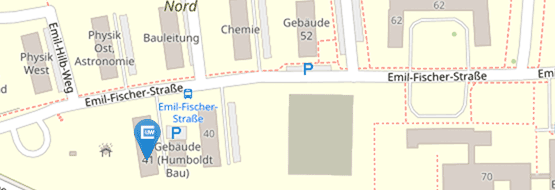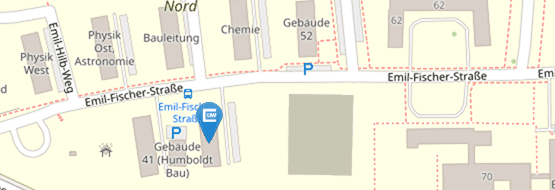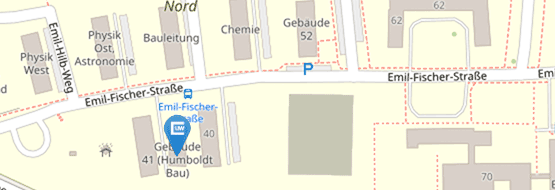Projekte
Optimization problems in fractional Sobolev spaces with application to sparse control problems
Collaboration partners
The project is a joint research project with Anna Lentz.
Project description
will follow
Funding
This project is funded by the German Research Foundation DFG under project grant Wa 3626/5-1.
-
Spatially sparse optimization problems in fractional order Sobolev spacesOptimization Methods and Software (2025)
-
A smoothed proximal trust-region algorithm for nonconvex optimization problems with L^p-regularization, p∈(0,1)https://arxiv.org/abs/2508.15446 (2025)
- [ arxiv ]
-
Capacitary measures in fractional order Sobolev spaces: Compactness and applications to minimization problemsESAIM Control Optim. Calc. Var. 31, 82 (2025)
-
Control in the coefficients of an elliptic differential operator: topological derivatives and Pontryagin maximum principleMathematical Control & Related Fields (2024)
-
Sparse optimization problems in fractional order Sobolev spacesInverse problems 39, 044001 (2023)
-
Strong stationarity for optimal control problems with non-smooth integral equation constraints: Application to continuous DNNsAppl. Math. Optim. 88, (2023)
Algorithms for Optimization Problems in Banach Spaces with Non-smooth Structure
Collaboration partners
The project is a joint research project with Christian Kanzow, Carolin Natemeyer and Bastian Dittrich.
Project description
The aim of this project is to develop and analyse algorithms for the numerical solution of some highly difficult optimization problems in Banach spaces. This includes mathematical programs with complementarity constraints, switching constraints, or problems involving a sparsity term either in the objective function or the constraints. By exploiting the special structure of these problems, the goal is to derive solution methods with strong global and local convergence properties under realistic, problem-tailored assumptions. All methods will be implemented and tested extensively on several relevant examples.
Funding
This project is funded by the German Research Foundation DFG under project grant Wa 3626/3-2 within SPP 1962.
-
A DC-Reformulation for Gradient-L^0-Constrained Problems in Function Spaceshttps://arxiv.org/abs/2506.11917 (2025)
- [ arxiv ]
-
The largest-K-norm for general measure spaces and a DC Reformulation for L^0-Constrained Problems in Function SpacesOptimization Methods and Software (2025)
-
A numerical solution approach for non-smooth optimal control problems based on the Pontryagin maximum principleIn: Gallego, R. and Mateos, M. (eds.) Proceedings of the French-German-Spanish Conference on Optimization (2024)
- [ arxiv ]
-
A topological derivative-based algorithm to solve optimal control problems with L^0(Ω) control costJ Nonsmooth Anal. Opt. 5, (2024)
-
Optimal control problems with L^0(Ω) constraints: maximum principle and proximal gradient methodComp. Opt. Appl. 87, 811-833 (2024)
-
Non-monotone proximal gradient methods in infinite-dimensional spaces with applications to non-smooth optimal control problemsIn: Non-Smooth and Complementarity-Based Distributed Parameter Systems. Springer (2023)
- [ DOI ]
-
Sparse optimization problems in fractional order Sobolev spacesInverse problems 39, 044001 (2023)
-
A simple proof of the Baillon-Haddad theorem on open subsets of Hilbert spacesJ. Convex Anal. 30, 1319-1328 (2023)
- [ arxiv ]
-
Strong stationarity for optimal control problems with non-smooth integral equation constraints: Application to continuous DNNsAppl. Math. Optim. 88, (2023)
-
A Note on Existence of Solutions to Control Problems of Semilinear Partial Differential EquationsSIAM J. Control Optim. 61, 1095-1112 (2023)
-
A penalty scheme to solve constrained non-convex optimization problems in BV(Ω)Pure Appl. Funct. Anal. 7, 1857–1880 (2022)
- [ arxiv ]
-
Second-order conditions for non-uniformly convex integrands: quadratic growth in L^1J Nonsmooth Anal. Opt. 3, (2022)
-
A proximal gradient method for control problems with non-smooth and non-convex control costComp. Opt. Appl. 80, 639–677 (2021)
-
First and second order conditions for optimal control problems with an L^0 term in the cost functionalSIAM J. Control Optim. 58, 3486–3507 (2020)
-
Full stability for variational Nash equilibriums of parametric optimal control problems of PDEshttp://arxiv.org/abs/2002.08635 (2020)
- [ arxiv ]
-
Iterative hard-thresholding applied to optimal control problems with L^0(Ω) control costSIAM J. Control Optim. 57, 854-879 (2019)
Algorithms for Quasi-Variational Inequalities in Infinite-dimensional Spaces
Collaboration partners
The project is a joint research project with Christian Kanzow and Veronika Karl.
Project description
The aim of this project is to develop and analyse algorithms for the numerical solution of some classes of quasi-variational inequalities. Such inequalities occur, e.g., in connection with generalized Nash equilibria in multi-player control problems. Moreover, they are widely used to describe the value function in stochastic control problems. Our goal is twofold: (a) Transfer existing solution methods from finite-dimensional to infinite-dimensional problems. (b) Develop problem-tailored solution methods by taking into account the particular structure of certain quasi-variational inequalities. All methods should have a strong theoretical background and will be tested extensively on suitable examples.
Funding
This project is funded by the German Research Foundation DFG under project grant Wa 3626/3-1 within SPP 1962.
-
Safeguarded augmented Lagrangian methods in Banach spacesIn: Hintermüller, M., Herzog, R., Kanzow, C., Ulbrich, M., and Ulbrich, S. (eds.) Non-Smooth and Complementarity-Based Distributed Parameter Systems. pp. 241-282. Birkhäuser (2022)
- [ DOI ]
-
A Lagrange multiplier method for semilinear elliptic state constrained optimal control problemsComp. Opt. Appl. 831-869 (2020)
-
On the uniqueness of non-reducible multi-player control problemsOptimization Methods and Software (2019)
-
The multiplier-penalty method for generalized Nash equilibrium problems in Banach spacesSIAM J. Optim. 29, 767-793 (2019)
- [ DOI ]
-
An augmented Lagrangian method for optimization problems in Banach spacesSIAM J. Control Optim. 56, 272-291 (2018)
-
An augmented Lagrange method for elliptic state constrained optimal control problemsComp. Opt. Appl. 69, 857-880 (2018)
- [ DOI ]
-
A joint Tikhonov regularization and augmented Lagrange approach for ill-posed state constrained control problems with sparse controlsNumer. Funct. Anal. Optim. 39, 1543-1573 (2018)
Regularization and Discretization of Inverse Problems for PDEs in Banach Spaces
Collaboration partners
The project is a joint research project with Dr. Frank Pörner, Christian Clason (Duisburg-Essen) and Barbara Kaltenbacher (Klagenfurt).
Project description
The aim of this project is a combined analysis of regularization and discretization of ill-posed problems in Banach spaces specifically in the context of partial differential equations. Such problems play a crucial role in numerous applications ranging from medical imaging via nondestructive testing to geophysical prospecting, with the Banach space setting mandated by the inherent regularity of the sought coefficients as well as structural features such as sparsity.
Funding
This project is funded by the German Research Foundation DFG under project grant Wa 3626/1-1.
-
On the uniqueness of non-reducible multi-player control problemsOptimization Methods and Software (2019)
-
Iterative hard-thresholding applied to optimal control problems with L^0(Ω) control costSIAM J. Control Optim. 57, 854-879 (2019)
-
Second-order analysis and numerical approximation for bang-bang bilinear control problemsSIAM J. Control Optim. 56, 4203-4227 (2018)
-
Error estimates for the approximation of a discrete-valued optimal control problemComp. Opt. Appl. 71, 857-878 (2018)
-
Regularization Methods for Ill-Posed Optimal Control Problemshttp://nbn-resolving.org/urn:nbn:de:bvb:20-opus-163153 (2018)
-
A priori stopping rule for an iterative Bregman method for optimal control problemsOptimization Methods and Software 33, 249-267 (2018)
-
A joint Tikhonov regularization and augmented Lagrange approach for ill-posed state constrained control problems with sparse controlsNumer. Funct. Anal. Optim. 39, 1543-1573 (2018)
-
Inexact Iterative Bregman Method for Optimal Control ProblemsNumerical Functional Analysis and Optimization 39, 491-516 (2018)
-
Stability for bang-bang control problems of partial differential equationsOptimization 67, 2157-2177 (2018)
-
Tikhonov regularization of optimal control problems governed by semi-linear partial differential equationsMathematical Control & Related Fields 8, 315-335 (2017)
-
Sufficient second-order conditions for bang-bang control problemsSIAM J. Control Optim. 55, 3066-3090 (2017)
- [ DOI ]
-
On the switching behavior of sparse optimal controls for the one-dimensional heat equationMathematical Control & Related Fields 8, 135-153 (2017)
-
An iterative Bregman regularization method for optimal control problems with inequality constraintsOptimization 65, 2195-2215 (2016)
-
A sharp regularization error estimate for bang-bang solutions for an iterative Bregman regularization method for optimal control problemsIn: Proceedings in Applied Mathematics and Mechanics. pp. 787-788 (2016)
-
Functional error estimators for the adaptive discretization of inverse problemsInverse Problems 32, 104004 (2016)
Higher-order finite elements for optimal control problems
Collaboration partners
The project is a joint research project with Sven Beuchler (Bonn).
Project description
The mathematical models of many technical processes contain partial differential equations. Here, it is important to optimize these processes. Often the optimization variables are subject to constraints that have to be taken into account. As model problem, consider the minimization of a functional
g(y)+j(u)
subject to the elliptic equation
-Δy =u on Ω, y=0 on Γ
and pointwise control
ua ≤ u ≤ ub
and state constraints
ya ≤ y ≤ yb
The numerical solution of this problem offers many challenges. One of them is the low regularity of Lagrange multipliers associated to the state constraints, which are measures. The global regularity of the solution of the optimal control problem is limited by quantities that have small support.
The project will exploit this property and develop methods for an adaptive hp-discretization of the optimal control problem, where the solution is approximated by high-order polynomials on large triangles where it is smooth, whereas the solution is approximated by low-order polynomials on small triangles in regions, where it is non-smooth.
Funding
This project was funded by the Austrian Research Fund FWF under project grant P23484.
- Exponential convergence of hp-finite element discretization of optimal boundary control problems with elliptic partial differential equations
D. Wachsmuth, J.-E. Wurst
SIAM J. Control Optim. 54(5), 2526-2552 (2016).
- Optimal control of interface problems with hp-finite elements
D. Wachsmuth, J.-E. Wurst
Numerical Functional Analysis and Optimization 37(3), 363-390 (2016).
Final version. The Version of Record of this manuscript has been published and is available in Numerical functional analysis and optimization, 09.02.2016, at http://www.tandfonline.com.
- An interior point method designed for solving linear quadratic optimal control problems with hp finite elements
D. Wachsmuth, J.-E. Wurst
Optimization methods and software 30(6), 1276-1302 (2015).
Preprint version.
- Boundary concentrated finite elements for optimal control problems with distributed observation
S. Beuchler, K. Hofer, D. Wachsmuth, J.-E. Wurst
Comp. Opt. Appl. 62, 31-65 (2015).
Final version. The final publication is available at link.springer.com.
- Robust error estimates for regularization and discretization of bang-bang control problems
D. Wachsmuth
Comp. Opt. Appl. 62, 271-289 (2014).
Final version. The final publication is available at link.springer.com.
- Boundary concentrated finite elements for optimal boundary control problems of elliptic PDEs
S. Beuchler, C. Pechstein, D. Wachsmuth
Comp. Opt. Appl. 51(2), 883-908 (2012).
- Schwarz type solvers for hp-FEM discretizations of mixed problems
S. Beuchler, M. Purrucker
Comput. Methods Appl. Math. 12(4), 369-390 (2012).
Preprint version.
- Inexact additive Schwarz solvers for hp-FEM discretizations in three dimensions
S. Beuchler
In: Advanced finite element methods and applications, Lect. Notes Appl. Comput. Mech. Vol. 66, 91-108, Springer (2013).
Preprint version.
Numerical verification of optimality and optimality conditions for optimal control problems
Project description
Many technical processes are described by partial differential equations. Here, it is important to optimize these processes. This leads to optimization problems in an infinite-dimensional setting.
As model problem, consider the minimization of a functional
g(y)+j(u)
subject to the elliptic equation
-Δy + d(y)=u on Ω, y=0 on Γ
and pointwise control constraints
ua ≤ u ≤ ub
Despite its simple structure, this problem offers many difficulties and challenges. Due to the non-linear elliptic equation this optimisation problem becomes non-convex.
If one has computed solutions yh and uh of discretized versions of this problem, the question arises
Are yh and uh indeed an approximation of a solution of the infinite-dimensional problem?
Due to the inherent non-convexity of the optimization problem, this question is by far non-trivial. The project wants to give answers to this question with information that is computable from the numerical solution. The methods that will be applied are based on techniques from optimal control, finite element methods, and eigenvalue computations.
Funding
This project was funded by the Austrian Research Fund FWF under project grant P21564.
- A-posteriori error estimates for optimal control problems with state and control constraints
A. Rösch, D. Wachsmuth
Numerische Mathematik 120(4), 733-762 (2012).
Final version. The final publication is available at link.springer.com.
- A-posteriori verification of optimality conditions for control problems with finite-dimensional control space
S. Akindeinde, D. Wachsmuth
Numerical Functional Analysis and Optimization 33(5), 473-523 (2012).
Preprint version.
- Numerical verification of optimality conditions
A. Rösch, D. Wachsmuth
SIAM J. Control Optim. 47(5), 2557-2581 (2008).
- Adaptive methods for control problems with finite-dimensional control space
S. Akindeinde, D. Wachsmuth
In: System Modelling and Optimization, 59-69, Springer (2013).
Final version. The final publication is available at link.springer.com.
- How to check numerically the sufficient optimality conditions for infinite-dimensional optimization problems
A. Rösch, D. Wachsmuth
In: Control of Coupled Partial Differential Equations, Internat. Ser. Numer. Math. Vol. 158, 297-317, Birkhäuser (2009).







